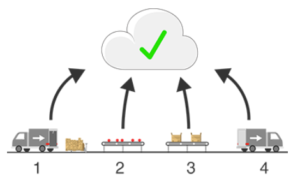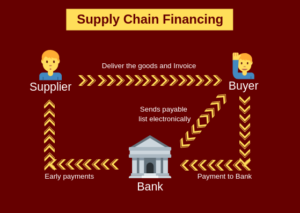Introduction
Blockchain technology is changing the way we do business. It is used in many industries, including banking, energy, healthcare, telecommunications, government, and many others. Some of the industries using blockchain include supply chain management, finance, and healthcare.
In addition, It is a decentralized technology that makes transactions secure and transparent. In supply chain management, blockchain is used to create immutable ledgers that can be accessed and shared securely by anyone. Supply chain management is a process that includes the entire production cycle. It starts with the planning and coordination of resources, and ends with delivery and customer satisfaction.
Moreover, Supply chain management is one of the oldest businesses that use the internet. It is a process that involves the coordination of multiple participants such as manufacturers, suppliers, distributors, and retailers. Suppliers produce goods and products for retailers. Retailers buy the products, sell them to the end consumers, and provide them with services.

Benefits of Blockchain in Supply Chain Management
Increased Transparency
Transparency is one of the most important factors of the modern economy. Most people today want to know what is going on around them. If companies and organizations don’t provide this kind of transparency, consumers will eventually start leaving them. They can get frustrated with companies that don’t give them the information they need.
Additionally, There are many different ways that blockchain can be used to make things more transparent. One way to do this is by creating a public ledger that can be accessed by anyone. All transactions are logged in real-time. Everyone who needs to check up on the information can do so easily. This is another way that blockchain can help you to be more transparent. It gives everyone access to the same data.
Further, Another way to be more transparent is to make sure that information about the products you sell is available for everyone to see. This will help you to build trust among customers and increase your sales. You should try to have everything that is necessary to run your business be recorded on the blockchain. You should put all of your company’s documents and records on the blockchain. This will help to prevent any tampering with your data.

Enhanced Traceability
In traditional supply chain management, companies try to trace the goods that move through the supply chain. They try to make sure that the goods that were sold are the same ones that were bought. Sometimes, companies find it difficult to determine whether the goods are genuine or not.
In addition, This is the main reason why you should use a blockchain in supply chain management. You can use blockchain to ensure that all parties involved in the supply chain can trace the movement of goods from the point of origin to the final destination.
Moreover, Supply chain management is not a new concept. However, the use of blockchain technology in supply chain management has been increasing rapidly. Blockchain can ensure that all transactions are permanent and tamper-proof. This makes it easy to trace the movements of goods through the supply chain.
For example, you can use the blockchain to trace the movement of a product from the point of manufacture to the point of sale. This means that all companies involved in the supply chain can follow the movement of goods from the point of origin to the final destination. You can also use blockchain in supply chain management to store information about goods.

Improved Security
Blockchain technology also provides improved security in supply chain management. The system has many users which all share a single database of information. The information is secured by cryptography. With this technology, data cannot be modified or destroyed. This means that the data can never be changed.
Moreover, The data is distributed across all the nodes of the network, ensuring that there is no single point of failure. The technology has proven to be very secure because data can’t be tampered with or changed. The technology uses advanced cryptography to protect data from unauthorized access and tampering. This makes it difficult for hackers to access sensitive data and commit fraud. All of the information stored in the database is encrypted, which means that hackers will not be able to access it.

Increased Efficiency
Blockchain technology can also increase efficiency in supply chain management. By eliminating intermediaries and streamlining processes, blockchain can reduce the time and cost of conducting transactions in the supply chain. This can improve supply chain performance and enhance customer satisfaction.
Additionally, Blockchain technology is based on the concept of distributed ledgers, which means that transactions are done with no central authority. This eliminates the middleman from transactions and increases efficiency.

Use Cases of Blockchain in Supply Chain Management
Tracking and Tracing Products
Tracking and tracing products can help companies to improve their supply chains. For example, if a company has a quality problem, it can identify the source of the problem immediately and fix it quickly. It is also easier for companies to manage and control their inventory.
Further, It is possible to use blockchain for tracking and tracing. Blockchain allows people to share information securely and instantly. Companies are able to use this technology to track and trace products.
Moreover, The technology enables the creation of a permanent record of all transactions and activities related to a particular product. This means that all parties involved in the supply chain can track the movement of the product from the point of origin to the final destination. The transactions can be verified using cryptographic signatures. This makes sure that the data is reliable and authentic.

Supply Chain Finance
Blockchain can also be used to streamline supply chain finance. Supply chain finance is very important in business. It involves a number of steps to ensure that the supply of products and services is continuous. When companies make deals with their vendors, they must pay the supplier in advance.
However, the amount of money involved in these payments can be quite large. It is also necessary to pay the supplier when the product or service is delivered. The transaction can be delayed because of changes in the market. Smart contracts can help to eliminate this problem. A blockchain-based smart contract allows you to track the status of the deal and ensure that the payments are made in due time.
Importantly, By using a smart contract, you can save time and reduce the risk of fraud. When the supply chain finance is automated, it is easier for the business to conduct transactions with its suppliers. The process can be done faster, and the information about payments can be recorded in the blockchain network.

Inventory Management
Many companies make use of blockchain technology to track the inventory of items. This can help them to manage their inventory better. They are able to monitor the inventory status of products as well as identify any shortages. This information can help them to understand the exact quantity of products that are left in warehouses.
In addition, They can also use this data to help reduce overstock in their warehouse. Inventory managers can use the inventory data to ensure that they are not running low on stock. They can make sure that they have enough of the right products available to meet customers’ demands.
Moreover, The blockchain data can also help to reduce the number of returns that they receive. Customers can check the inventory status of a product online to determine whether it is out of stock. This can help to avoid unnecessary returns.

Supplier Verification
Supplier verification refers to the process of verifying the authenticity of a supplier in the supply chain. This process is essential to ensure that the supplier is legitimate and can be trusted to provide quality goods or services.
In addition, With the help of blockchain technology, supplier verification becomes more reliable and transparent. The technology enables the creation of a permanent record of all transactions and activities related to a particular supplier. This means that all parties involved in the supply chain can verify the authenticity of the supplier by accessing the same information in real-time.
For instance, if a supplier claims to have a specific certification or license, blockchain technology can enable all parties in the supply chain to verify the authenticity of the certification or license by accessing the same records. This helps to eliminate the risk of fraudulent activities and ensures that the supplier is compliant with all necessary regulations and requirements.
By implementing blockchain technology for supplier verification, companies can increase the reliability and trustworthiness of their supply chain. This can ultimately lead to improved supply chain performance and increased customer satisfaction.

Conclusion
Blockchain is an emerging technology that is gaining popularity. It is a decentralized and distributed network that stores data in a public ledger. The technology uses cryptography and has the ability to store information and share it with all members.
In addition, It is becoming a major driver in the development of digital finance. Some of its characteristics include transparency, security, trust, decentralization, and immutability. Companies can leverage the power of this technology to provide better services to customers and increase their revenue.
However, The use of blockchain is transforming supply chain management. Blockchain can help companies to make their supply chains more efficient, transparent, secure, and cost-effective. A few of its benefits include increased visibility, transparency, and traceability, which can lead to reduced inventory costs, improved productivity, and improved customer satisfaction.



